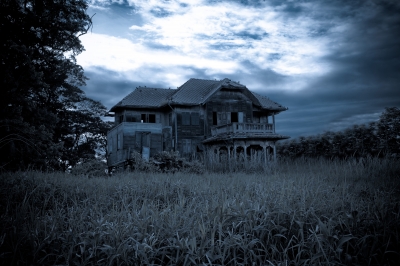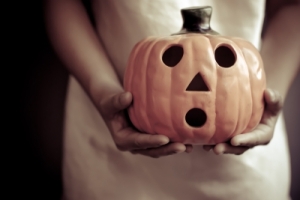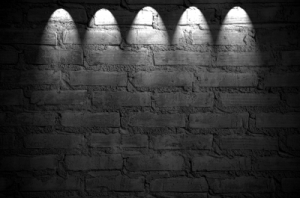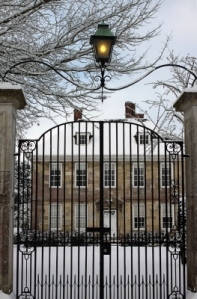Image Evgeni Dinev, Freedigitalphotos.net

I woke up in the Land Without Hope, and had almost forgotten that I had been chosen as one of the legion in a long line of demonic sacrifices. For a second I couldn’t fathom where I had landed. It was only when I looked up from the horizon and realised that the black sky was utterly devoid of stars that I knew that I was in that other place, that no one comes back from. Stars, for us, represent hope, a past, a legacy. Without stars you don’t know where you came from, and you can’t go home again. Your soul has no celestial way of navigating, and in this place, no earthly purchase either.
But stars must also be striven for and towards. In that darkness I saw no possibilities at all, and heaven knows I looked.
The Land Without Hope was pockmarked, and strewn with old objects that no one had a use for anymore. As I looked about at the the strands of metal peeking out from under dunes, and the old bones, and the tattered books, and the odd socks, I felt a misery in knowing that here, I belonged at last. Finally they had found a place for me where I would not stand out.
I smiled slightly as I discovered the truth of it. A lot of humour has no hope in it at all. Or rather, as Manthorn would say, joyless laughter is the very sound of hope leaving. You deploy it because there is nothing else to say. That empty laughter filled the foothills of the Land Without Hope. Foothills that held black-hearted vultures at their peaks. They made the laughter ring. Purple-eyed fiends who feed on empty-socketed creatures roaming the tundra.
I surveyed them for a moment and wondered who had rejected them. I was there as a sacrifice, thankfully, I knew that. It made me think that at least I would be swallowed up whole and not left to wander like one of those pathetic creatures which had ceased to be human. You could only see them after a few minutes, their melting bodies blended into the monotony of the yellow scrub, and hid amongst the shapes of trees, casting no shadows. There were strange trees in that land. Their branches were twisted into shapes of suicidal agony. I remember thinking how melodramatic it all was – whoever had fashioned this landscape had wrought pain and anguish into its folds in the most unimaginative fashion. No wonder the vultures are laughing, I thought.
Getting tired of that hellish landscape I sat down, and became maudlin and introspective. I wondered when exactly the Demon King would come for me, when I might be eaten, and what he might look like. Did he speak? Was there any point in negotiating? I looked down at my hands, the palms had healed. There were no blisters now. Nothing to remind me of the hours spent trying to escape from those bonds, from the ropes that bound me, and from the darkness of the cell I had languished in for months; even when it was a fate I had initially chosen for myself, for a while I still fought it. It broke my heart to see those smooth hands, devoid of scars. It made me appreciate the loss of my humanity. They told me once, -and I from my prison cell believed them – that humanity is a thing you can’t win back in the Land Without Hope.
One of the melting walkers approached me. Its limbs dissolving as I looked. There are so many of them. I thought. They were everywhere, the more you looked across the wasteland the more undulating, stumbling corpses revealed themselves. I wondered if this walker would get close to me before it melted away all together. In the corner of my eye I saw another one rise, and another, moaning, their mouths a sticky maw of frustration.
I looked down at my feet, and sought around for something to throw. I like throwing, I had always been good at it. I had the aim of a professional, and more passion than the other girls. I could always throw farther, I never stopped to think about what I looked like when I pitched the stones into the water. When I killed the Priest of Gold it was with a stone. The blow shattered his skull. He died a good death and that was all that mattered. I did what I was told because I didn’t feel then I had any other choice.
“They put you in the path of destiny, and on you blithely go.” Manthorn said to me, when I he saw I had taken on the commission. I had put on the ceremonial robes of an assassin.
“You do know where they will send you, don’t you?” He asked, one eyebrow raised so high as if were looking for a way to float off his old face altogether.
“You do this, and no one is going to think to thank you afterwards. You don’t get a handshake and a pat on the back.” Light was streaming through the slit in the wall onto his gown. It was a pale dying Winter light. I knew there would be no more Summers where I was going.
“One hell is the same as another.”
“No, you see that’s where you are wrong.” He answered. “They could send you to any number of hells for killing a High Priest.”
“Who decides?”
He shrugged. “Who can say? I don’t know the inner workings of these people, these chancellors. I’m just an old magician.”
I shook my head at him and put on the gloves.
“Find me a rock.” I said. “A stone.”
Manthorn’s face grew pale and a thousand years swam about in his eyes.
“There are convicts who could do this job, true believers, I don’t know why you want to do this. Only a fool would volunteer to martyr themselves for no good reason.”
It was my turn to shrug at him. “I have reasons enough.”
Now, standing in that place alone with the walker in front of me, I felt the anger return. When you loose everything over and over again it becomes meaningless, and yet you don’t for a minute learn to stop accumulating things to love. At last I was in place where there was nothing, absolutely nothing to love. I could never loose anything ever again.
“Aah!” I picked up a chewed sandal, bearing the teeth marks of an animal, and I threw it. The walker recoiled from the the blow and stopped in its tracks. I picked up another object, a metal poker this time.
“I have an appointment with the Demon King.” I said to the walker. “You’re going to take me to me or I’ll run you through.”
I knew it didn’t matter what I did to that shape, it couldn’t look anymore monstrous than it did now. Perhaps it knew that. The shape just slunk away. For a while I followed it until its limbs just evaporated into the wind and left a rancid odour that stayed in my nostrils wherever I went. And go I did. I searched up and down for my destroyer, but he never came.
It was only one day – I say day, but there is no time in the Land Without Hope – that I happened to feel a shift in the thick dust of the air. I looked up from the shapes I was drawing in the sand to see a figure materialise.
“Manthorn!” I ran to him, not even looking where I was going, but he vanished.
This went on for a sizeable eternity. This game of cat and mouse with Manthorn’s shade. In the meantime I traced my way through the wasteland avoiding the staggering shapes and the tortured trees and instead seeking out things to keep from amongst the debris. Perhaps it is a human thing, to want to always be hanging on to something. More often than not I lay in the dust and wondered is there really nothing left to loose now? –As I acquired marbles and watch straps, letter openers and combs with broken teeth. I picked them up and left them in piles. I made my mark on the landscape without hope, and slowly but surely, I felt a purpose, growing here and there in the heaps of things that he been thrown away. But I had a use for them.
When Manthorn finally became corporal it was a shock. He appeared behind me while I was stacking some chipped statuettes, one on top of the other to make a tower.
“So this is what you’ve been doing all this time.” He said, his tone caustic, his eyes fading in and out of his head where the magic waxed and waned.
“You’ve come through at last then, that took some effort didn’t it.”
“I thought you would be a bit more pleased to see me.” He folded his arms. I got up and walked right through him, just to be insolent. Just to show him I lived in the Land Without Hope now and didn’t care about his magic.
“Are you are just here to have a look round is that it-” I paced, encircling him like a cat. I heard him sigh.
“I thought this might happen. I told you they’d send you somewhere like this.”
“Enough of that.” I found myself shouting, but away from him, I had turned my back. I was still looking up at the void that was the sky and fighting something that felt like tears but which never manifested. “You may as well make yourself useful – help me find the Demon King and get this over with.”
“The Demon King.” Manthorn just repeated my words back to me. It made me howl in frustration. I felt for a second like one of those walkers with their gaping sorrowful mouths.
“You heard me.” I said. Manthorn nodded. “Let me take you then.” He said. “Follow me.”
I remember thinking what’s the old fool up to. But I followed him anyway. We stalked through the dunes and past the piles of oddities I had collected. Manthorn made a show of examining a fair few of them. He bent over the sad little heaps of broken treasures and hummed and haahed over them. I wanted to hurry him on but I had somehow lost the heart to.
We came at last to mountain of dust and dirt and scree that blocked out anything beyond it. Here the walkers wouldn’t venture, and even those damned trees wouldn’t grow.
“Is this the place then?” I asked Manthorn.
“See for yourself.” He said, and beckoned with one ghostly hand forward.”May I ask what you intend to do?”
“Do?”
“Well yes. When you encounter the Demon King.”
I paused. I looked back and saw in the distance the mounds of broken things and felt a weird pride in them. In my collections, how I had made something out of nothing.
“Manthorn,” I said to him, “find me a stone.”
I took what he gave me, his face still creased in wonderment, and I climbed to the top of that ridge and gazed out. I had pulled at the earth with my hands to get a purchase and I felt the beginnings of pain. It made me stop for a moment and try and remember why that sensation mattered. I looked down at my palms and saw they were blistered. I looked out and down and there, sitting on his own heap of rejected ornaments, was the Demon King.
When I looked he looked too. His eyes were the most truly hopeless thing in the Land Without Hope. In fact, they were the epicentre of all it held. Reflected in his eyes I saw the vultures with their black plumes, and the branches of the strangled trees. I saw the melting walkers and the darkness without stars. I heard the joyless laughter as if it were carried on a whirlwind around that figure sitting squat, and unfathomably huge in the middle of that hoard. His head held eight horns, he had four thick legs, his two arms where constantly moving over the objects under his stump-like feet.
I felt my pulse race, I gripped my rock. I had to ask myself, why doesn’t he rise? Why doesn’t he rush at me with those horns and tear me to pieces. Why is he just watching me with those eyes?
Then he rose, he came slowly towards me. A new realisation came over me. I couldn’t work out what it was.
Throw it
The voice said.
Kill me
I froze. There was an eternity in which I watched the Demon King and he waited. In his eyes then I saw all the sorrows I had ever known, and all the dejections, the bereavements. I let my arm fall slack. I waited for him to make everything right, to fulfill his side of an ancient bargain but he never came at me.
You can destroy me.
The voice said finally, pitifully.
I cursed him then, and put down my rock. I let it just roll away.
The Demon King slunk back. He began to diminish in size until he could burrow under the mountain of broken objects, until he was gone.
Manthorn appeared at my shoulder, suitably smug.
“You didn’t fancy becoming King of the Land Without Hope then?”
“No.” I said. “Now there really isn’t any hope at all, is there. No hope of being devoured I mean. Of leaving here.”
Manthorn wiggled his eyes brows in answer, his arms folded again. I turned my back on the Demon’s hoard and made to walk back down the mountain. But Manthorn called after me.
“The Demon King isn’t gone you know.”
“Oh?” I called back. Utterly disinterested now.
“-But you know now that there is no devouring. You either walk away or you take his place.”
“Fascinating”
“Wait.” I waited. I don’t know why, perhaps Manthorn still had some real magic in him that was not for conjuring illusions.
“When you picked up that rock you meant to kill him. What did you hope to achieve?”
I struggled with the answer.
“To fight back. I suppose. I don’t know. Perhaps I hoped I could change everything by killing him.”
I felt a sudden twinge, I dropped to my knees, winded.
“You hoped did you?” Manthorn said.
I looked up then, my hands round my ribs. The guards had broken them when they threw me down the stairs after I had killed the Priest of Gold. I had forgotten the pain, but it came over me in a relieving wash. As I said, I felt the pain in my ribs but I looked up, I felt my gazed being dragged skywards. Stars were bursting out all over the night, burning through the blanket of darkness like stray coals on a carpet.
“Why is it doing that?” I cried out to Manthorn, but his figure was shimmering and loosing its focus.
“There,” I heard him say, and he pointed out towards an island forming up ahead of us in the night, suspended in the sky. It was a green place, it was bright, I almost thought I saw the twinkle of water gushing out into nothing.
I gasped as I felt my blood surging in my veins, and my eyes now truly watering with tears.
“Only humanity has the capacity to find something to hope for in the Land Without Hope.” Manthorn said from the mountain top.
“I’ll never reach it from here.” I shouted out in disgust at him, the novelty of the pain was wearing off, but he was laughing with joy
“Anything visible, feasible or tangible is surmountable. To enter the Land Full of Hope, all you have to do is hope for it,”
Then, as is characteristic with all magicians, he vanished.
I sat up and having nothing else to look at or for, stared out at that glittering island in the distance. I grasped my ribs with my blistered hands and I stood. Somewhere down below I thought I heard the Demon King howling.
“Come on.” I shouted down to him, painfully motioning him to get off his hoard and follow.
The Demon King looked up at me with curious eyes now.
“We are going on an adventure,” I told him, “now get moving.”
He shuffled to his feet, his horned head bowed, sulking, but compliant.
“And find me a stone.” I said.
How? The voice asked.
I cleaned some sand out of my eyes and thought of Manthorn.
“Try hoping for one.” I told him.
The Demon King looked at me perplexed for a moment, before a memory appeared to surface in his eyes and we set off as somewhere behind us, the eyeless corpses began rooting through the piles of dis-guarded things as if finally seeing them for the first time.










